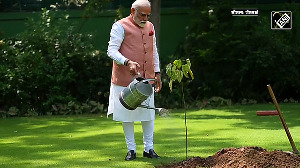Twitter can probably afford to wait it out. But would it have the moral courage to do so? asks Devangshu Datta.

Twitter and the Indian government are in an eyeball-to-eyeball confrontation.
The Bharatiya Janata Party would like Twitter to remove all tweets that don't show the party and the governments it runs in good light, while displaying every tweet that is pro-government or anti-Opposition uncritically.
Indeed, it would like this situation to prevail across all social media but especially Twitter.
The BJP is especially upset because Twitter flagged a specific post by a BJP spokesperson as ;Manipulated media'.
To that end, the minister for electronics and information technology has cited the IT Rules 2021 and stated Twitter has lost its intermediary status, exposing it to penalties for anything a user may post.
This statement jumps the gun. The IT Rules face multiple legal challenges.
The Rules may be violative of Constitutional rights to free expression and privacy.
They are based on parent legislation and exceed the scope of the parent IT Act, which subsidiary legislation cannot.
Even if the IT Rules are accepted as Constitutional and they might not be, it would still be up to courts to decide if the technical status of Twitter as an intermediary with a protective legal shield would apply.
It's an interesting situation. The BJP sees Twitter as a platform for outreach, especially overseas.
The party, and its friends and relatives, have spent huge sums building organisations to disseminate messages on Twitter.
Switching to messaging on alternate micro-blogging platforms is possible, but the audience may not switch.
The simplest way to understand this is to look at numbers.
According to Twitter, there are less than 20 million active users in India -- just 18-19 million. (Twitter has 353 million daily users globally).
Also, according to Twitter, Prime Minister Narendra Modi has 69 million followers on his personal Twitter account.
Ergo, a large majority of Mr Modi's Twitter followers are not based in India.
Banning Twitter, and forcing it out of India, is possible.
The set of five nations which have blocked Twitter include China, Iran, North Korea, Turkmenistan and most recently, Nigeria.
None of these are shining examples of free democracies.
But the global audience would not migrate and might see a ban as undemocratic, making other multinational corporations wary.
India would probably not wish to be spoken of in the same breath as the nations mentioned in a previous sentence.
Apart from not being democracies, that set of five has another thing in common; none seeks financial aid or investment.
Corporates invest in China in the hopes of generating revenues and profits from access to the world's second-largest economy.
Nigeria has oil; Iran has oil (and has survived decades of sanctions as a result), North Korea and Turkmenistan have spectacularly isolationist regimes run by strongmen.
As a result, none of the five cares about global image.
The trade component of India's gross domestic product is roughly 40 per cent and India is energy-deficit.
As a result, India does care about global image -- just look at the list of trips Mr Modi has made since 2014.
India is actively seeking investment and has been, since the 1990s.
It could, given the economic devastation caused by mismanagement of the pandemic, become a basket case if foreign direct investment and foreign portfolio investment inflows dry up.
On Twitter's part, it would not like to lose access to the third-largest user base.
But revenues right now are negligible. Twitter generated just 30 per cent of its January-March 2021 revenues outside of Japan and the US.
India is a small percentage of the rest of the world revenues.
So, apart from legal shenanigans, who blinks first? Both have something to lose.
There's the time factor to consider.
If it looks to ban Twitter, the BJP would have to refocus its messaging and persuade users to switch platforms before the next round of elections.
Twitter can probably afford to wait it out. But would it have the moral courage to do so?











